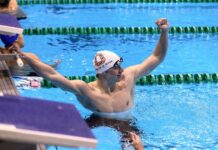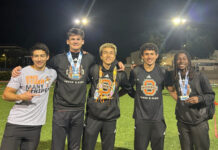 Occidental College has a proud history of student athletes who dedicate their time, energy and money to participating in club sports. But despite the fact that they are recognized, according to the college handbook, as a “valuable part of the Occidental experience,” the college fails to provide adequate institutional and financial support to these programs so that the athletes may perform at their highest level. Because of the benefits that club sports offer to both those who participate and the Occidental community as a whole, the administration and Associated Students of Occidental College (ASOC) should work to make club sport participation as accessible and safe as possible for all who wish to be involved.
Occidental College has a proud history of student athletes who dedicate their time, energy and money to participating in club sports. But despite the fact that they are recognized, according to the college handbook, as a “valuable part of the Occidental experience,” the college fails to provide adequate institutional and financial support to these programs so that the athletes may perform at their highest level. Because of the benefits that club sports offer to both those who participate and the Occidental community as a whole, the administration and Associated Students of Occidental College (ASOC) should work to make club sport participation as accessible and safe as possible for all who wish to be involved.
Currently, there are seven club sports operating on campus: men’s and women’s rugby and ultimate frisbee, dance team, cheerleading and men’s lacrosse. Operating outside the strict guidelines of the National Collegiate Athletic Association (NCAA), club sports have the flexibility to modify their individual structure each year. They have the freedom to choose their own schedules and coaches and to write a constitution for their team that can change from year to year. This malleability creates a culture of dedication because there is no compulsion to participate.
The benefits of club sports extend to personal and mental growth, as well. Studies have shown time and time again that sports foster a sense of community, build confidence and character and nurture leadership skills among participants. Being involved with the administration and management of a club sport teaches organization, dedication and commitment— all skills that pay dividends over the course of a lifetime. On a personal level, many athletes develop bonds with their teammates that last beyond their time in college.
Despite all of the benefits of athletic involvement, club sport athletes face significant financial and logistical hurdles. ASOC Senate allocated $29,000 in funding to club sports for the 2015–16 school year, which was distributed among the seven club sports. This amounts to 4.11 percent of ASOC’s annual operating budget. This funding partially covers the operating costs of a club team, but club sport athletes are often forced to pay out of pocket to cover tournament fees, transportation, coaching and injuries, if and when they occur (club sport athletes often find themselves at risk of serious injury, because they do not have access to the training rooms of the athletic facilities). The financial burden can make playing a club sport impossible for many students.
As any varsity athlete will attest, financial support from the college is hard to come by, especially when most of Occidental’s athletics programs are not profit-generating ventures. Many varsity sports are forced to fundraise for themselves through letter-writing campaigns and fundraisers at sports events. But despite the lack of financial resources available to athletic programs of any type at Occidental, varsity sports teams have priority (and often exclusive) access to fields and facilities over club sports, most notably with regard to access to the training room. If a club sport athlete needs ice, they need to go to the Cooler to ask for some.
Many teams that Occidental club sports compete against are generously funded by their home institutions, which puts Occidental at a distinct disadvantage when competing. Lewis & Clark College and Carleton College receive nearly six times as much funding from their schools for their ultimate frisbee team than does Occidental. Despite these obstacles, our teams have a history of performing remarkably well in intercollegiate competition, with our men’s rugby team winning nationals in 2013 and men’s frisbee currently fighting for a bid to nationals for 2016.
Institutional support for club sports is also severely lacking. Because of restrictions imposed by the college’s insurance, the trainers at Occidental cannot provide physical training or medical assistance to athletes participating in club sports. This can pose severe risks for students engaging in intense sports like rugby, where concussions and broken limbs are commonplace. If the college was able to provide the readily available medical assistance that the trainers can offer, the number of students that suffer from injuries that could easily be healed with sufficient physical therapy or consistent use of the resources already present in the training complex would fall drastically. Ty Hranac (sophomore), member of the men’s ultimate frisbee team, emphasized the importance of preventative care when keeping club sport athletes safe. He said that the best way to support club sport athletes would be to increase access to preventative care. Increased funding for club sports could also allow for teams to cover medical expenses of their players both before and after injuries arise.
[poll id=”6″ align=”right” background=”on” border=”right” shadow=”on”]
Challenges notwithstanding, club sports provide a valuable outlet for students to participate in competitive athletics during their time at Occidental. Club sport athletes invest as much time, energy and dedication to their athletics as varsity athletes, yet they fail to receive sufficient funding or institutional support from the college. They can provide an indispensable platform for learning and growth for those who participate. Club sports should be accessible to every student at Occidental who wishes to be able to dedicate and commit themselves to the challenges that being a student-athlete entails, and both the administration and ASOC Senate should provide them with the institutional support and financial resources to do so.
Kara Alam is a junior Diplomacy and World Affairs major. She can be reached at koenigalam@oxy.edu.
![]()






























